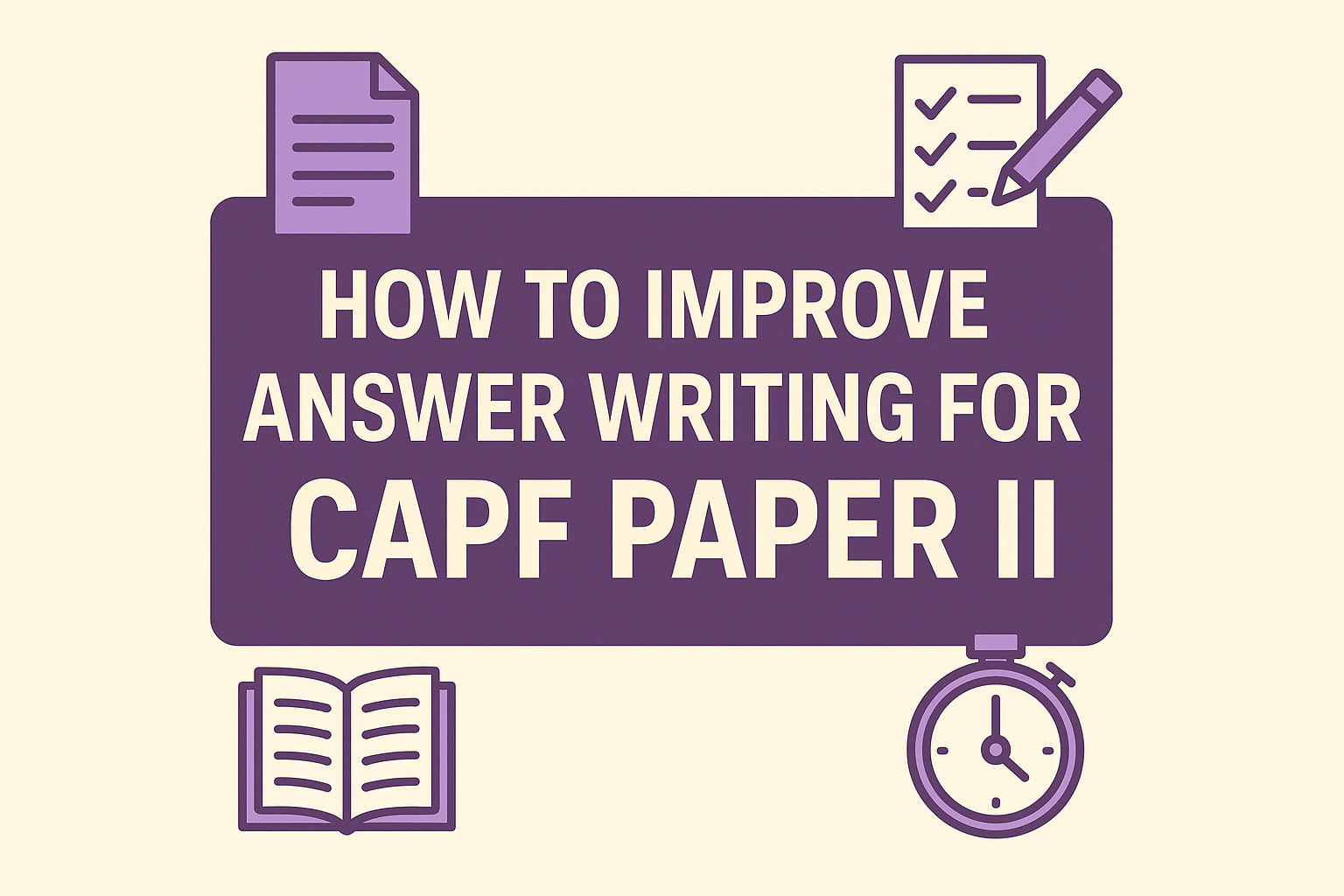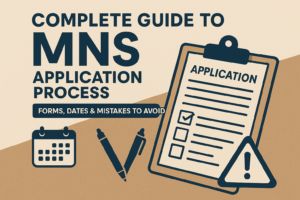Introduction
CAPF Paper II (descriptive English) is where you convert knowledge into marks. Strong answer-writing scores you reliable points in the paper and makes your profile stronger for later stages. This guide shows exactly what examiners look for, how to structure each answer type, practical templates, a study plan, and common pitfalls — plus how Victor Growth Coaching supports aspirants with focused feedback and practice.
Why Paper II Matters
Paper II tests clarity of thought, expression, compressive ability and writing skills — essential for an officer’s communication.
Even if your Paper I score is good, weak writing can cost you crucial marks.
Written answers are easy to improve quickly if you follow a disciplined practice routine and get targeted feedback.
What Examiners Look For (Scoring Rubric)
Relevance & Content (35-40%) — accurate, factually correct, well-developed points.
Structure & Organisation (25%) — clear intro, logical paragraphs, headings where relevant, neat conclusion.
Language & Vocabulary (20%) — appropriate register, varied vocabulary, correct collocations.
Expression & Clarity (10%) — concise sentences, flow, coherence.
Mechanics (5%) — grammar, punctuation, spelling, word limit adherence.
Focus on content first; polish language later.
Question Types & How to Approach Them
1) Essays
Goal: Present a balanced, structured argument with examples and a strong conclusion.
Structure (simple template):
Intro (1–2 paragraphs): Define the topic, give context, state your thesis/approach.
Body (3–5 paragraphs): Each paragraph = one idea (cause → effect → solution / pro → con → example). Use headings or transition lines for clarity. Include one current-affairs or historical example.
Conclusion (1 paragraph): Summarize and give a forward-looking line or recommendation.
Length & Time: Aim for 220–350 words depending on the topic and marks. Spend 45–60 minutes on a high-mark essay.
Tactics: Start with a brief plan (2–3 minutes), write, then spend final 3–4 minutes polishing.
2) Précis Writing
Goal: Condense a passage to its essence, maintaining tone and key facts.
Method (stepwise):
Read the passage fully.
Underline the thesis and major supporting points.
Ignore examples/illustrations unless essential.
Write the gist in one continuous paragraph — no personal comments.
Keep one-third to one-half of original length unless instructed otherwise.
Use synonyms only where meaning is preserved. Keep grammar correct.
Tactics: Practice with 250–400 word passages and reduce to ~90–130 words.
3) Comprehension & Precis-based Qs
Approach:
Read quickly to get the theme, then scan for answers.
For inferential questions — look for implied lines; don’t invent facts.
For vocabulary in context — provide synonyms that match tone.
Tactics: Annotate the passage with short margin notes (theme, purpose, tone).
4) Report / Letter / Application / Official Writing
Report format: Title, To/From (if applicable), Date, Subject, Intro (purpose), Details (paragraphs), Recommendations, Signature line. Use bullet points for recommendations/actions. Be formal and precise.
Letter format: Address, salutation, intro (purpose), body (facts & request), conclusion, signature. Keep it professional.
Tactics: Learn standard phrases (e.g., “I am writing to draw your attention…”, “It is recommended that…”).
5) Grammar, Vocabulary & Usage (short Qs)
Practice error spotting, sentence correction and fill-in blanks.
Focus on prepositions, tenses, subject-verb agreement, modals, and articles.
Build collocation knowledge (make vs do, take vs have).
Exam-Day Time Management (Sample split for 3 hours / 180 minutes)
Adjust to marks distribution, but a practical split:
Essay: 50–60 mins
Précis + Short Qs (vocab/grammar): 40–45 mins
Comprehension / Case-based answers: 40–45 mins
Revision & Proofreading: 10–15 mins
Always plan first (2–3 minutes). Reserve final 10–15 minutes for editing.
Practical Writing Templates & Checklists
Essay paragraph checklist: Topic sentence → Explanation → Example/evidence → Mini-conclusion/transition.
Précis checklist: No examples; retain facts; use reporting verbs; be concise; check word count.
Report checklist: Title, Purpose, Facts, Analysis (if needed), Clear Recommendations (numbered).
Proofreading checklist: Spelling (names/dates), Agreement (subject/verb), Punctuation, Word limit, Neatness.
8-Week Practice Plan (Progressive & Intensive)
Weeks 1–2: Foundations
Read editorials daily (30–45 min). Learn 8–10 words/day.
Practice 3 short essays/week (150–200 words). Grammar drill 30 min/day.
Weeks 3–4: Structuring & Precision
1 full essay/week (250–300 words). 2 précis exercises/week. Timed grammar tests.
Start a “mistake log” for recurring errors.
Weeks 5–6: Application & Speed
Alternate mock Paper II once every 10 days. Focus on clarity and coherence.
Peer or mentor feedback on 2 essays/week.
Weeks 7–8: Simulation & Polishing
Weekly full Paper II mocks under exam conditions. Intensive revision of the mistake log. Final polishing of presentation and handwriting if needed.
Daily & Weekly Practice Habits (Checklist)
Read one long editorial + one short opinion piece.
Write one timed paragraph (10–15 min) on current topic.
Revise 20 vocab words using sentences.
Do one précis/comprehension twice a week.
Review mistake log every Sunday.
Common Mistakes & How to Avoid Them
Rote/irrelevant content: Stick to the question; don’t wander.
Poor structure: Use paragraphs and headings; a paragraph per idea.
Overly long sentences: Use clear, short sentences.
Weak examples: Prefer relevant, recent, or historical examples.
Ignoring proofreading: Many marks lost to avoidable errors.
Forgetting presentation: Neatness, margins, and legible handwriting matter.
Helpful Resources
Grammar & Usage: Wren & Martin (select practice), High School English Grammar.
Vocabulary: Word Power Made Easy (Norman Lewis).
Editorial Reading: The Hindu, Indian Express editorials.
Practice Books: Previous years’ CAPF papers, model answer compendia.
Coaching/Feedback: Regular evaluated essays & marked mock papers.
How Victor Growth Coaching Helps You Improve Faster
Victor Growth Coaching provides focused, practical support aimed at maximizing your Paper II score:
Essay Clinics & Live Marking: Faculty evaluate your essays with line-by-line feedback.
Précis & Comprehension Workshops: Stepwise practice and individual correction.
Weekly Mock Papers: Timed full Paper II mocks with detailed answer keys.
Personalized Error Logs: We help you create and work through a mistake log so errors don’t repeat.
Vocabulary & Grammar Modules: Weekly sessions focused on collocations, idioms, and common grammar traps.
Report / Official Writing Drills: Templates, sample letters, and practice with real-life prompts.
Flexible Batches (online/offline): So working or college aspirants can still get mentoring and feedback.
Victor Growth’s approach emphasizes practice + feedback — the fastest route to measurable improvement.
SEO Keywords (use throughout your content/website)
CAPF Paper II answer writing tips
CAPF essay writing strategy
How to write précis for CAPF
CAPF English Paper improvement
Victor Growth Coaching CAPF
FAQs
Q1. How long before the exam should I start focused Paper II practice?
Start practicing 8–12 weeks before the exam with increasing mock intensity in the final 4 weeks.
Q2. How many essays should I write per week while preparing?
Begin with 2–3 short essays/week, scale to 3–5 timed essays/week as the exam approaches.
Q3. What is the ideal essay length for CAPF Paper II?
Aim for 220–350 words for full-mark essays unless instructions specify otherwise. Clarity beats length.
Q4. How important is vocabulary vs clarity?
Clarity is paramount. Use appropriate vocabulary — avoid obscure words used just to impress.
Q5. Should I memorize model answers?
No. Memorised answers are easy to spot and penalized if irrelevant. Learn structures and reusable examples instead.
Q6. How do I improve handwriting and presentation?
Practice writing full answers under timed conditions and focus on spacing, paragraphing and legibility. Use headings or underlines for sections.
Q7. Can coaching really help with Paper II?
Yes — if it offers regular marking, model answers, and personalized feedback. Victor Growth Coaching focuses on those elements.
Q8. How to tackle a topic I know little about?
Plan quickly: define the issue, identify 2–3 general points (causes, consequences, solutions), use generic examples (policy, law, social effect), conclude with recommendations.
Q9. How much time should I leave for proofreading?
Reserve 8–12 minutes per paper for quick proofreading: check grammar, word limits, and glaring errors.
Q10. How do I reduce negative marks from grammar errors?
Keep sentences short, avoid flashy constructions, and proofread. Work intensively on common error types in your mistake log.






